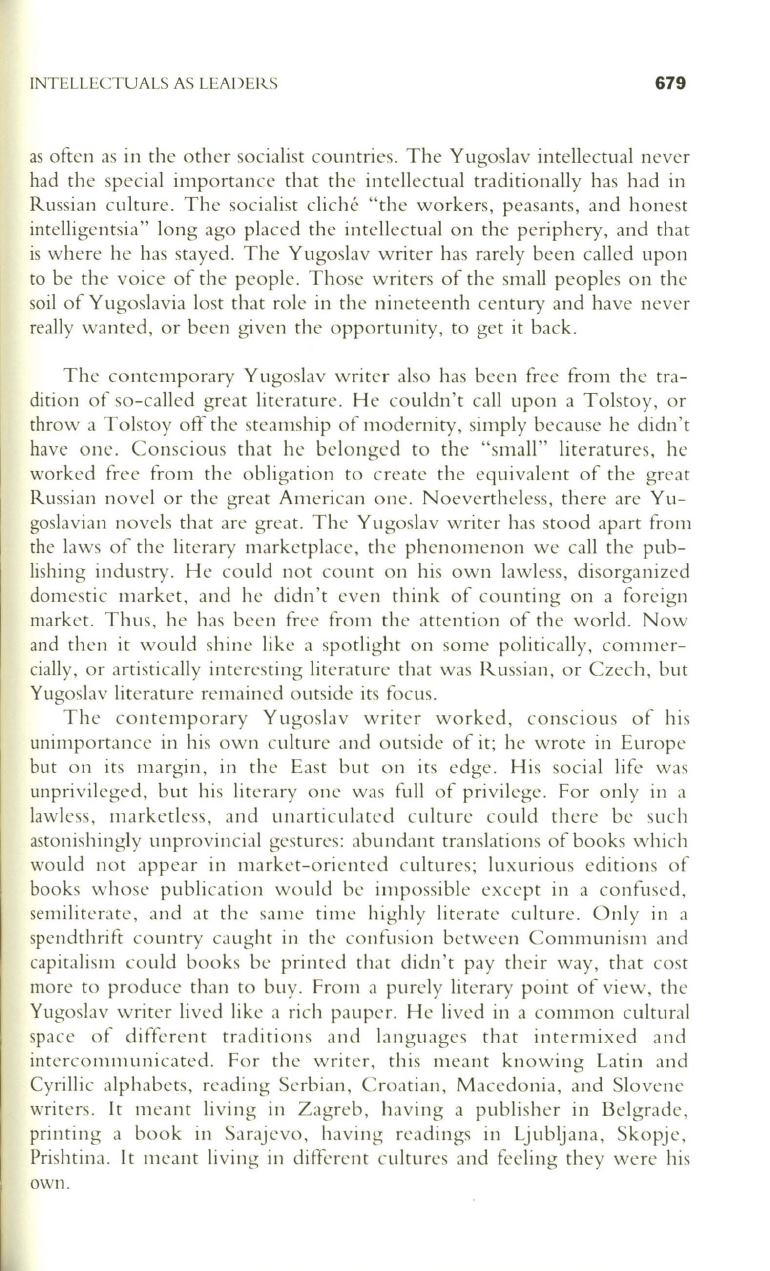
INTELLECTUALS AS LEADEI(S
679
as often as in the other socialist countries. The Yugoslav intellectual never
had the special importance that the intellectual traditionally has had in
Russian culture. The socialist cliche "the workers, peasants, and honest
intelligentsia" long ago placed the intellectual on the periphery, and that
is where he has stayed. The Yugoslav writer has rarely been called upon
to
be the voice of the people. Those writers of the small peoples on the
soil of Yugoslavia lost that role in the nineteenth century and have never
really wanted, or been given the opportunity, to get it back.
The contemporary Yugoslav writer also has been free from the tra–
dition of so-called great literature. He couldn't call upon a Tolstoy, or
throw a Tolstoy off the steamship of modernity, simply because he didn't
have one . Conscious that he belonged to the "small" literatures, he
worked free from the obligation to create the equivalent of the great
Russian novel or the great American one. Noevertheless, there are Yu–
goslavian novels that are great. The Yugoslav writer has stood apart frol11
the laws of the literary marketplace, the phenomenon we call the pub–
lishing industry. He could not count on his own lawless, disorganized
domestic market, and he didn't even think of counting on a foreign
market. Thus, he has been free from the attention of the world. Now
and then it would shine like a spotlight on some politically, commer–
cially, or artistically interesting literature that was Russian, or Czech, but
Yugoslav literature remained outside its focus.
The contemporary Yugoslav writer worked, conscious of his
unimportance in his own culture and outside of it; he wrote in Europe
but on its margin, in the East but on its edge . His social life was
unprivileged, but his literary one was full of privilege. For only in a
lawless, marketless, and unarticulated culture could there be such
astonishingly unprovincial gestures: abundant translations of books which
would not appear in market-oriented cultures; luxurious editions of
books whose publication would be illlpossible except in a confused ,
semiliterate, and at the same time highly literate culture. Only in a
spendthrift country caught in the confusion between Communism and
capitalism could books be printed that didn't pay their way, that cost
more to produce than to buy. From a purely literary point of view, the
Yugoslav writer lived like a rich pauper. He lived in a common cultural
space of different traditions and languages that intermixed and
intercommunicated. For the writer, this meant knowing Latin and
Cyrillic alphabets, reading Serbian, Croatian, Macedonia, and Slovene
writers.
It
meant living in Zagreb , having a publisher in Belgrade ,
printing a book in Sarajevo, having readings in Ljubljana, Skopje,
Prishtina.
It
meant living in different cultures and feeling they were his
own.


